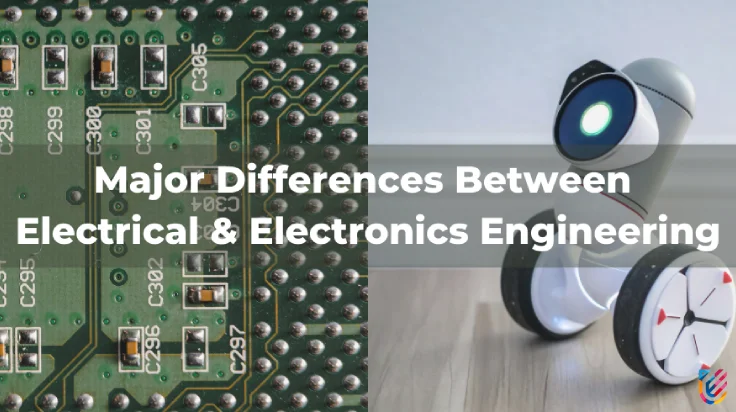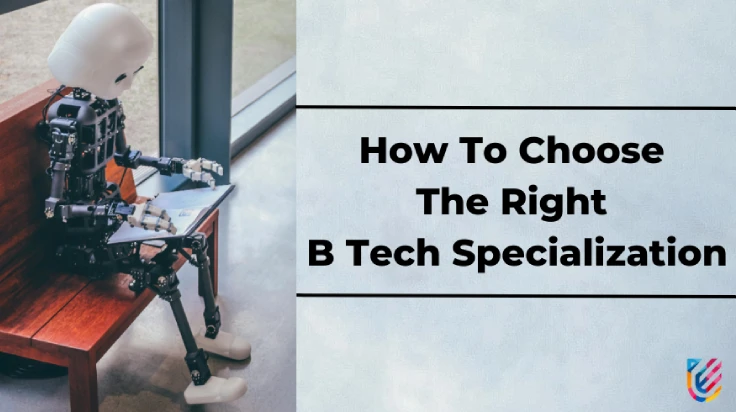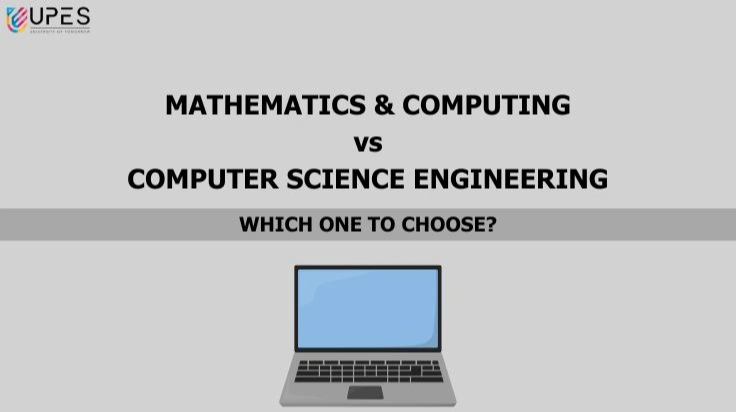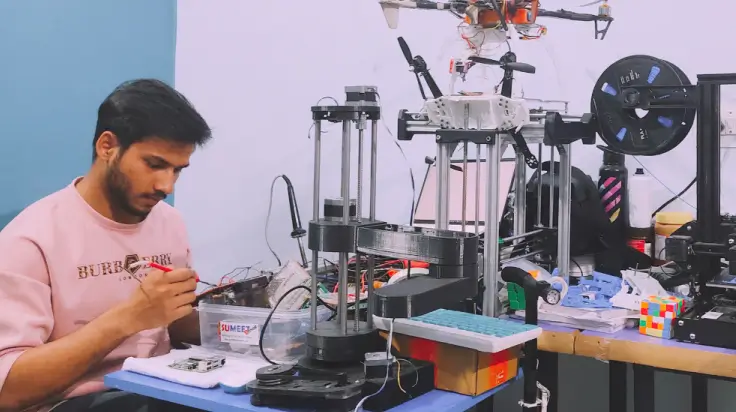Major Differences between Electrical Engineering & Electronics-Engineering
- UPES Editorial Team
- Published 05/03/2025

Table of Contents:
Electrical Engineering Course Offerings
Electronics Engineering Course Offerings
Similarities between Electrical and Electronics Engineering
Career Paths
Industries to Work
Skills Needed
Salary Difference between Electrical and Electronics Engg.
Educational Requirements
Technological Application
Challenges & Future Trends
Electrical engineering focuses on the study and application of electricity, electromagnetism, and electronics. It encompasses a wide range of subfields, including power systems, control systems, telecommunications, and signal processing.
Become future-ready with our Advanced Engineering programs
Know MoreElectronics engineering is a subfield of electrical engineering that focuses specifically on the design and development of electronic circuits, devices, and systems. This field covers a wide range of applications from consumer electronics to advanced communication systems.
Electrical engineering focuses on high-voltage applications and large-scale electrical systems, such as power generation, transmission, and distribution. It includes subjects like power systems, electromagnetics, and control systems, with applications in power plants and industrial machinery. In contrast, electronic engineering specializes in low-voltage applications and the design of electronic circuits and devices. It covers analog and digital electronics, microelectronics, and embedded systems, with applications in consumer electronics, communication devices, and computer hardware. While electrical engineering deals with large-scale infrastructure, electronic engineering focuses on smaller, detailed electronic components and systems.
Electrical Engineering Course Offerings:
- Circuit Analysis: Basic principles of electric circuits, including Ohm's law, Kirchhoff's laws, and network theorems.
- Electromagnetics: Study of electric and magnetic fields, Maxwell's equations, and their applications.
- Power Systems: Generation, transmission, and distribution of electrical power, including renewable energy sources.
- Control Systems: Analysis and design of feedback systems, stability, and control strategies.
- Signal Processing: Techniques for analyzing and manipulating signals, including filtering, Fourier transforms, and digital signal processing.
- Electronics: Fundamentals of electronic devices and circuits, including diodes, transistors, and operational amplifiers.
- Microprocessors: Architecture and programming of microprocessors and microcontrollers.
- Communication Systems: Principles of data transmission, modulation, and information theory.
- Electric Machines: Study of electric motors and generators, their operation, and control.
- Instrumentation: Measurement techniques, sensors, and instrumentation systems.
Electronics Engineering Course Offerings:
- Electronic Devices and Circuits: Detailed study of semiconductors, diodes, transistors, and their applications in circuits.
- Analog Electronics: Design and analysis of analog circuits, including amplifiers, oscillators, and filters.
- Digital Electronics: Principles of digital logic, including Boolean algebra, logic gates, flip-flops, and digital circuits.
- Microelectronics: Study of integrated circuits (ICs), including fabrication processes and design techniques.
- Embedded Systems: Design and programming of embedded systems using microcontrollers and real-time operating systems.
- VLSI Design: Very-Large-Scale Integration (VLSI) design principles, including digital and analog IC design.
- Communication Electronics: Electronic principles applied to communication systems, including modulation, demodulation, and signal processing.
- Power Electronics: Design and application of electronic devices for the control and conversion of electrical power.
- Instrumentation and Measurement: Electronic measurement techniques, sensors, and transducers.
- Consumer Electronics: Design and development of consumer electronic products like smartphones, tablets, and home appliances.
What are the Similarities between Electrical and Electronics Engineering
Both fields share a common foundation in basic electrical principles and often overlap in areas like- circuit design, signal processing, and microprocessors.
1. Scope
However, electrical engineering has a broader scope, including large-scale power systems and electromagnetics, while electronics engineering focuses more on the micro-level design and development of electronic devices and systems.
Each course in these fields typically combines theoretical knowledge with practical laboratory work to provide a comprehensive understanding of the principles and applications of electrical and electronics engineering.
Both electrical and electronics engineering overlaps between fields like control systems, robotics, automation and Emerging technologies like Smart grids, Internet of Things (IoT), embedded systems.
2. Concepts
- Define electrical engineering:
- Scope: Power generation, transmission, and distribution.
- Application areas: Power systems, renewable energy, etc.
- Key principles: Ohm's law, circuits, electromagnetism.
- Define electronics engineering:
- Scope: Small-scale electronic systems and devices.
- Application areas: Consumer electronics, telecommunications, etc.
- Key principles: Semiconductor devices, digital electronics.
Career Paths in Electrical and Electronics Engineering
Career paths in electrical engineering focus on high-voltage systems, including power generation, transmission, and control systems. Roles include power engineer, control systems engineer, and energy systems engineer. In contrast, electronics engineering careers revolve around low-voltage applications, such as circuit design, embedded systems, and consumer electronics. Key roles include electronics design engineer, embedded systems engineer, and VLSI engineer. Both fields offer diverse opportunities in industries ranging from utilities to consumer electronics.
Electrical Engineering Job Roles | Electronics Engineering Job Roles |
| Power Engineer | Electronics Design Engineer |
| Control Systems Engineer | Embedded Systems Engineer |
| Electrical Design Engineer | VLSI Engineer |
| Energy Systems Engineer | Consumer Electronics Engineer |
| Electric Machines Engineer | Communication Systems Engineer |
| Utility Engineer | Microelectronics Engineer, RF Engineer |
| Substation Engineer | PCB Designer |
| Grid Engineer | Instrumentation Engineer/ Signal Processing Engineer |
Industries to work for:
Electrical Engineering as well as Electronics engineering graduates can work in a variety of ever-growing fields like Power, Renewable, Manufacturing, telecom and more. Based on the area you specialize in or choose to make your career; you can decide what industry you want to work in.
| Field | Industries | Field | Industries |
| Electrical Engineering | Power Generation and Distribution | Electronics Engineering | Consumer Electronics (Smartphones, Tablets, Home Appliances) |
| Renewable Energy (Solar, Wind, Hydro) | Telecommunications (Networking, Wireless Communication) | ||
| Utilities (Electricity, Water, Gas) | Automotive | ||
| Industrial Automation and Manufacturing | Medical Devices and Healthcare Technology | ||
| Construction and Building Services | Semiconductor Manufacturing | ||
| Transportation (Rail, Aviation, EVs) | Computer Hardware (Microprocessors, Memory Chips) | ||
| Telecommunications | Industrial Electronics | ||
| Defense & Aerospace | Robotics and Automation | ||
| Oil and Gas | Defense and Aerospace | ||
| Research & Development | Research and Development |
Skills Needed:
| Skill Type | Electrical Engineer | Electronics Engineer |
| Technical Skills | Circuit Analysis and Design | Analog and Digital Circuit Design |
| Power Systems Analysis and Design | Microelectronics Design | |
Control Systems Design and Implementation | VLSI (Very-Large-Scale Integration) Design | |
| Electromagnetic Field Theory | Embedded Systems Design | |
| Electric Machines and Drives | PCB (Printed Circuit Board) Design | |
| Signal Processing Techniques | RF (Radio Frequency) Design | |
| Power Electronics | Semiconductor Device Fabrication | |
| Programming Skills | MATLAB, Simulink | Embedded C/C++ Programming |
| Python | VHDL/Verilog for FPGA Design | |
| Analytical Skills | Problem-solving | Troubleshooting and Debugging |
| Data Analysis | Signal Integrity Analysis | |
| Communication Skills | Technical Report Writing | Collaborative Teamwork |
| Presenting Technical Information | Clear Documentation | |
| Project Management Skills | Project Planning and Execution | Resource Allocation |
| Risk Assessment and Management | Project Lifecycle Management | |
| Interpersonal Skills | Collaboration with Cross-functional Teams | Client and Stakeholder Communication |
| Leadership | Adaptability and Innovation | |
| Industry-specific Skills | Regulatory Standards, Safety Compliance | Knowledge of Industry Standards, Integration of Electronics into Real-world Applications |
| Hands-on Experience in Lab Settings, Testing Equipment | Soldering and Prototyping, Design Validation/ Testing |
Electrical Engineering vs Electronics Engineering Salary
Though similar in name, Electrical Engineering and Electronics Engineering differ in their scope and areas of operations. Students and graduates can specialize in their field of choice and industry demand which will decide their future growth in this domain.
Here’s an average of the salary differences between electrical engineers and electronics engineers in India:
| Experience Level | Electrical Engineer | Electronics Engineer |
| Entry Level (0-2 years) | 3-6 lakhs (annually) | 3-7 lakhs |
| Mid-Level (3-5 years) | 6-10 lakhs | 6-12 lakhs |
| Senior Level (6-10 years) | 10-20 lakhs | 12-25 lakhs |
| Experienced (>10 years) | 15-30+ lakhs | 18-35+ lakhs |
Average salaries can vary based on location, company size, specific industry, and individual skills and qualifications.
Educational Requirements for these fields
Both the engineering fields more or less requires the same qualifications from students who are pursuing a career in electrical or electronics.
- Bachelor's Degree: 4-year undergraduate degree (B.E. or B.Tech) in Electrical Engineering from a govt. recognized university.
- Master's Degree (Optional): Many positions, especially in specialized fields or research, may require a Master's degree (M.E. or M.Tech) in Electrical Engineering.
- Ph.D. (Optional): For roles in academia, advanced research, or leadership positions in industry, a Ph.D. in Electrical Engineering is often preferred or required.
In India, a Professional Engineer (PE) license is not required to work in electrical engineering fields. Unlike in some countries like the United States where a PE license is necessary for certain types of work.
Technological Applications in Both Fields
Both fields continuously innovate and intersect, contributing to advancements in technology that impact everyday life of consumers, industry efficiency, and global connectivity.
Examples of Electrical Engineering Applications:
- Power grids, renewable energy systems, electric vehicles.
- Impact on society and sustainability.
Examples of Electronics Engineering Applications:
- Integrated circuits, mobile devices, medical equipment.
- Influence on connectivity and communication.
Challenges and Future Trends
Energy efficiency, cyber security and environment sustainability are 3 things that are going to have a major impact on these fields and addressing these challenges will be crucial for growth of this industry.
On the other hand, industry trends like Smart Grids, Renewable Integration, IoT, AI-ML, quantum computing, wearables are necessary to drive innovation across industries and improving quality of life globally.

Our counsellors are just a click away.
Conclusion
Electrical engineering emphasizes power systems and infrastructure, while Electronics Engineering focuses on circuit design and consumer electronics. Career paths vary; electrical engineers work in power generation and control systems, whereas electronics engineers specialize in devices like smartphones and embedded systems. Choosing between them hinges on your interests in large-scale systems or intricate electronics, each offering diverse opportunities in technology-driven sectors.
UPES Editorial Team
Written by the UPES Editorial Team
UPES Admission Enquiry
Subscribe to UPES Blogs
Join our community for exclusive stories, insights, and updates
By clicking the "Subscribe" button, I agree and accept the privacy policy of UPES.















































